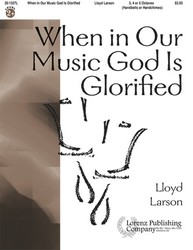- |
User Links
Go to the World
Hymn Information
- First Line
- Go to the world! Go into all the earth
- Author
- Sylvia Dunstan, 1955-1993
- Tune Name
- ENGELBERG
- Composer
- Charles Villiers Stanford, 1852-1924
- Topic
- Elements of Worship: Charge and Blessing
Copyright Information
- Text Copyright
- © 1991 GIA Publications, Inc.
- Tune Copyright
- Public Domain
- Reprint/Projection Information
- Words: Permitted with a license from OneLicense.net. If you do not own this license, please contact the copyright holder for permission.
- Music: The Music is in the Public Domain; you do not need permission to project or reprint the Music.
Scripture References
- · · · · · · · ·
Further Reflections on Scripture References
This is a fine “send-off” text. God’s people compel each other to do two things: first, to go into the world to preach and baptize in obedience to Christ’s Great commission in Matthew 28:19 (st. 1), and second, to serve as Christ’s representatives and servants in the world (st. 2-3). The final stanza reveals a change of voice: now we hear the direct words of Christ’s Great Commission, when he promises to be with his church until the end of time (Matt. 28:20b).
Sing! A New Creation
Confessions and Statements of Faith References
Further Reflections on Confessions and Statements of Faith References
According to the confessions, Christian worshipers are called to continue in service. Heidelberg Catechism, Lord’s Day 12, Question and Answer 32 instructs us to think of ourselves as “a member of Christ…[who] share in his anointing.” So we profess “I am anointed to confess his name, to present myself to him as a living sacrifice of thanks, to strive with a free conscience against sin and the devil in this life, and afterward to reign with Christ over all creation for eternity.” We serve him with good works, “…so that with our whole lives we may show that we are thankful to God for his benefits, so that he may be praised through us, so that we may be assured of our faith by its fruits, and so that by our godly living our neighbors may be won over to Christ” (Heidelberg Catechism, Lord’s Day 32, Question and Answer 86). And so we are moved to “…embrace God’s mission in [our] neighborhoods and in the world...” (Our World Belongs to God, paragraph 41). Christians, therefore, leave worship believing that “to follow this Lord is to serve him wherever we are without fitting in, light in darkness, salt in a spoiling world” (Our World Belongs to God paragraph 43).
Go to the World
Blessing/Benediction
Additional Prayers
Go to the World
Tune Information
- Name
- ENGELBERG
- Key
- G Major
- Meter
- 10.10.10 with alleluia
Recordings
Musical Suggestion
- As a parting hymn
- In ordination and commissioning services.
- As a "charge" hymn for those who've just professed their faith or their renewed faith.
Go to the World
Hymn Story/Background
Author Information
Her bachelor degree was earned from York University, and she received graduate degrees in theology and divinity from Emmanuel College, Toronto. In 1980, she was ordained by the Hamilton Conference of the United Church of Canada. During her career she served as a minister, a prison chaplain, and editor of a Canadian worship resource journal, Gathering.
In the summer of 1990, she was invited to lead the annual conference of the Hymn Society in the U.S. and Canada in a session exploring her hymnody. That exposure led to the publication of her texts In Search of Hope and Grace. A smaller collection Where the Promise Shines was published after her death in 1994. Many of her hymn texts have been set by contemporary composers.
Sylvia Dunstan died on July 25, 1993, almost four months after being diagnosed with liver cancer. She left behind a ministry that combined a compassionate concern for the needy and distraught with a consuming love of liturgy.


 My Starred Hymns
My Starred Hymns






